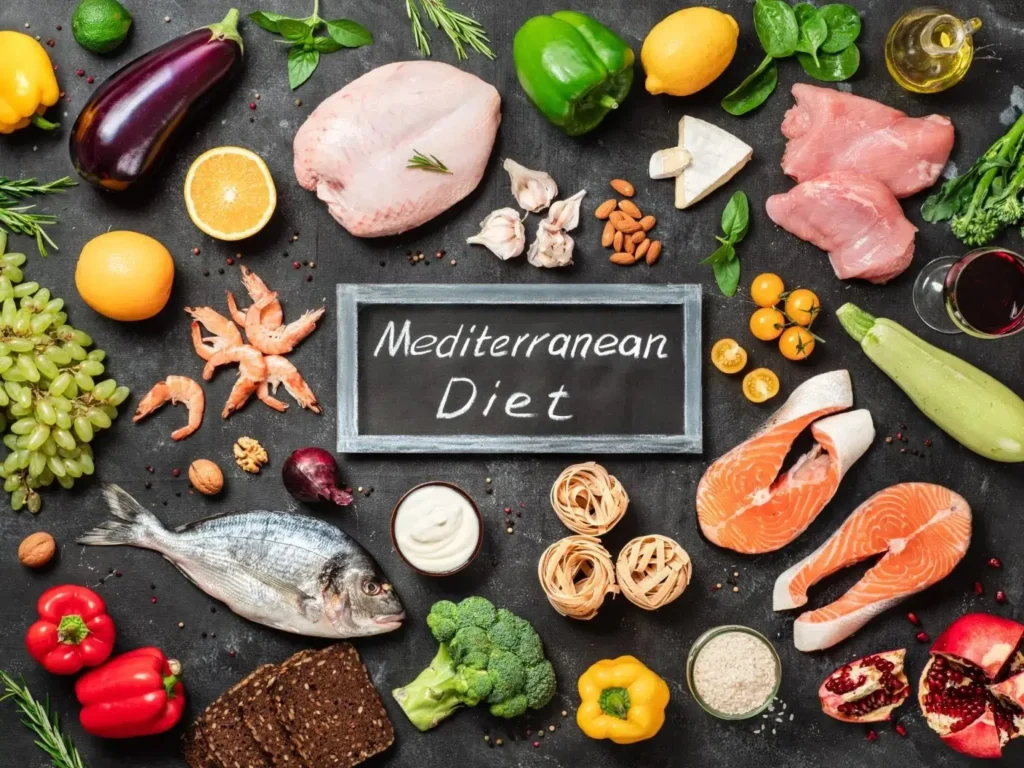Have you ever dreamt of Mediterranean living? While relocating might not be on your agenda, indulging in Mediterranean cuisine is easier than you think. Named the top diet of 2023 by US News and World Report, the Mediterranean Diet brings the taste of vacation to your home, with added health perks for your heart. If you’re curious about this nutrient-rich and flexible diet, here’s all you need to know to get started.
Table of Contents
What is the Mediterranean Diet?
Inspired by coastal living, the Mediterranean diet primarily consists of plant-based foods, seafood, lean poultry, whole grains, nuts, beans, olive oil, herbs, and spices. It emphasizes fresh over processed foods, offering a delicious array of flavors and textures.
The Green Mediterranean Diet
A popular variation, the Green Mediterranean diet, goes even greener by eliminating meats and focusing more on Plant-Based Foods. With specific daily targets for duckweed, green tea, and walnuts, this version may offer added heart and health benefits.
Benefits of the Mediterranean Diet
Beyond its appeal to various dietary preferences and budgets, the Mediterranean diet boasts numerous health benefits:
Heart Health: Studies suggest a reduced risk of stroke and heart disease due to lower saturated fat intake and healthier food choices.
Brain Health: This diet may lower dementia risk and enhance cognitive function as we age.
Weight Management: It could aid in weight loss and long-term weight maintenance, according to research.
How It Works
Counting calories isn’t necessary on the Mediterranean diet. Simply focus on the recommendations: regular seafood intake, hydration, variety in meals, and emphasis on fresh, wholesome foods.
Foods to Enjoy
Include plenty of fish, seafood, vegetables, fruits, whole grains, beans, nuts, olive oil, herbs, spices, and the occasional glass of red wine or dark chocolate.
Foods to Limit
While nothing is off-limits, try to minimize red meats, sugary treats, processed foods, and butter.
Sample Meal Ideas
Here are some meal inspirations to try throughout the week:
- Breakfast: Greek yogurt with fruit, or whole-wheat toast with peanut butter
- Lunch: Chicken orzo soup, or Greek salad
- Dinner: Salmon with brown rice and roasted vegetables, or tuna over quinoa and arugula
- Snacks: Nuts with cheese, or pita bread with hummus
Is It Right for You?
Consider trying the Mediterranean diet if you prefer flexible eating, enjoy seafood and plant-based foods, and seek a budget-friendly, heart-healthy lifestyle. Consult your doctor before making significant dietary changes, especially if you have specific health concerns or restrictions.
Frequently Asks Questions (FAQs)
What exactly is the Mediterranean Diet, and where did it originate?
The Mediterranean Diet is a dietary pattern inspired by the traditional eating habits of countries bordering the Mediterranean Sea. It emphasizes whole, plant-based foods such as fruits, vegetables, whole grains, nuts, and legumes, along with healthy fats like olive oil and moderate consumption of fish, poultry, and dairy. Red wine is also consumed in moderation. This diet has its roots in the eating habits of Greece, Italy, Spain, and other Mediterranean countries.
How does the Mediterranean Diet differ from other popular diets like keto or paleo?
Unlike the keto and paleo diets, which focus on restricting certain food groups (carbohydrates in keto, grains, and dairy in paleo), the Mediterranean Diet emphasizes whole, minimally processed foods from a variety of food groups. It also promotes the consumption of healthy fats like olive oil and encourages moderate wine consumption, whereas keto and paleo tend to limit or exclude certain fats and alcohol.
What are the key principles of the Mediterranean Diet, and why are they important?
The key principles of the Mediterranean Diet include a high intake of fruits, vegetables, whole grains, legumes, nuts, and seeds; moderate consumption of fish, poultry, and dairy products; and regular use of olive oil as the primary source of fat. Red meat and processed foods are limited, and red wine is consumed in moderation with meals. These principles are important because they provide a nutrient-rich, balanced approach to eating that has been associated with numerous health benefits.
Can you explain the health benefits associated with following the Mediterranean Diet?
The Mediterranean Diet has been linked to various health benefits, including improved heart health, reduced risk of chronic diseases such as diabetes and certain cancers, better cognitive function and brain health, and potential weight management benefits. These benefits are attributed to the diet’s emphasis on whole, nutrient-rich foods and healthy fats, along with its potential anti-inflammatory and antioxidant properties.
Are there specific guidelines or recommendations for portion sizes on the Mediterranean Diet?
While there are no strict portion size guidelines, the Mediterranean Diet encourages balance and moderation. Meals should be based on plant-based foods, with smaller portions of animal-based foods like fish and poultry. Olive oil, nuts, and seeds can be included in moderation, and red wine should be consumed in moderation.
Can you provide a sample meal plan for someone following the Mediterranean Diet?
A sample meal plan on the Mediterranean Diet might include meals like Greek yogurt with fruit for breakfast, a Greek salad with olives and feta cheese for lunch, and grilled salmon with roasted vegetables for dinner. Snacks could include nuts, seeds, or fresh fruit.
How does the Mediterranean Diet impact overall longevity and aging?
Research suggests that the Mediterranean Diet may be associated with increased longevity and a reduced risk of age-related diseases. Its emphasis on nutrient-rich foods, healthy fats, and antioxidants may contribute to improved health outcomes and a higher quality of life as individuals age.
Is the Mediterranean Diet suitable for individuals with specific dietary restrictions, such as gluten intolerance or lactose intolerance?
Yes, the Mediterranean Diet can be adapted to accommodate various dietary restrictions, including gluten intolerance and lactose intolerance. Many of the core foods in the Mediterranean Diet, such as fruits, vegetables, legumes, nuts, seeds, and lean proteins, are naturally gluten-free and dairy-free.
Are there any potential drawbacks or risks associated with following the Mediterranean Diet?
While the Mediterranean Diet is generally considered safe and beneficial for most people, it may not be suitable for individuals with specific dietary needs or medical conditions. Additionally, some individuals may find it challenging to follow if they are accustomed to a diet high in processed foods or if they have limited access to fresh, whole foods.
How does the Mediterranean Diet promote heart health, and are there specific foods that are particularly beneficial in this regard?
The Mediterranean Diet promotes heart health by emphasizing foods that are rich in heart-healthy nutrients such as omega-3 fatty acids, fiber, antioxidants, and monounsaturated fats. Foods like fatty fish (e.g., salmon, sardines), olive oil, nuts, seeds, fruits, vegetables, and whole grains are particularly beneficial for heart health.
Can the Mediterranean Diet help lower cholesterol levels, and if so, how?
Yes, the Mediterranean Diet has been associated with improvements in cholesterol levels, including reductions in LDL cholesterol (often referred to as “bad” cholesterol) and increases in HDL cholesterol (often referred to as “good” cholesterol). This is likely due to the diet’s emphasis on healthy fats, fiber, and antioxidants, which can help to lower LDL cholesterol and improve overall heart health.
Are there any specific cooking techniques or culinary traditions associated with the Mediterranean Diet?
Yes, the Mediterranean Diet is characterized by specific cooking techniques and culinary traditions that emphasize the use of fresh, seasonal ingredients, simple preparation methods, and the incorporation of herbs, spices, and olive oil for flavor. Common cooking techniques include grilling, roasting, steaming, and sautéing, while culinary traditions may include communal dining, leisurely meals, and an appreciation for locally sourced ingredients.
How does the Mediterranean Diet affect brain health and cognitive function?
The Mediterranean Diet has been linked to improved brain health and cognitive function, as well as a reduced risk of neurodegenerative diseases such as Alzheimer’s disease. The diet’s emphasis on nutrient-rich foods, healthy fats, and antioxidants may help to protect brain cells from damage and promote overall cognitive health.
Are there any specific guidelines for incorporating physical activity into a Mediterranean Diet lifestyle?
While the Mediterranean Diet itself does not prescribe specific physical activity guidelines, regular exercise is often recommended as part of a healthy lifestyle. Incorporating activities such as walking, swimming, cycling, or yoga can complement the Mediterranean Diet and further promote overall health and well-being.
Can following the Mediterranean Diet help prevent or manage chronic diseases like diabetes or hypertension?
Yes, the Mediterranean Diet has been associated with a reduced risk of chronic diseases such as type 2 diabetes, hypertension, and metabolic syndrome. Its emphasis on whole, nutrient-rich foods, healthy fats, and fiber may help to improve insulin sensitivity, lower blood pressure, and reduce inflammation, all of which are important factors in preventing and managing these conditions.
What role does olive oil play in the Mediterranean Diet, and are there different types of olive oil that are recommended?
Olive oil is a key component of the Mediterranean Diet and is used as the primary source of fat in cooking and meal preparation. Extra virgin olive oil, which is minimally processed and retains more of the olive’s natural antioxidants and flavor, is often recommended for its health benefits.
Are there any specific supplements recommended for individuals following the Mediterranean Diet?
While the Mediterranean Diet emphasizes whole, nutrient-rich foods and may provide many essential vitamins and minerals, some individuals may benefit from specific supplements to address potential nutrient deficiencies or health concerns. It’s important to consult with a healthcare professional before starting any supplement regimen.
How does the Mediterranean Diet impact weight management, and are there any strategies for optimizing weight loss while following this diet?
The Mediterranean Diet may support weight management and potentially aid in weight loss due to its emphasis on whole, nutrient-rich foods, healthy fats, and fiber, which can help to promote feelings of fullness and satisfaction. Additionally, the diet’s focus on balanced meals and moderate portions may contribute to sustainable weight loss over time.
Can children follow the Mediterranean Diet, and if so, are there any modifications or considerations to keep in mind?
Yes, children can follow a Mediterranean-style diet, and it may offer numerous health benefits for their growth and development. To accommodate children’s nutritional needs, it’s important to ensure a balanced intake of all food groups, including fruits, vegetables, whole grains, lean proteins, and healthy fats, while also considering portion sizes and meal variety.
How does the Mediterranean Diet address the environmental and sustainability aspects of food production and consumption?
The Mediterranean Diet is often praised for its focus on locally sourced, seasonal ingredients and traditional culinary practices, which can support sustainable food production and consumption. By prioritizing plant-based foods, minimizing food waste, and choosing sustainably sourced seafood and animal products, individuals following the Mediterranean Diet can reduce their environmental impact and promote sustainable food systems.
Are there any specific resources or support networks available for individuals looking to adopt the Mediterranean Diet?
Yes, there are numerous resources and support networks available for individuals interested in adopting the Mediterranean Diet, including cookbooks, online recipes, meal-planning guides, and community-based programs or support groups. Additionally, registered dietitians and healthcare professionals can provide personalized guidance and support for individuals seeking to implement the Mediterranean Diet into their lifestyle.
Can the Mediterranean Diet be adapted for individuals with cultural or religious dietary restrictions?
Yes, the Mediterranean Diet can be adapted to accommodate various cultural and religious dietary restrictions by substituting or modifying certain foods while still adhering to the overall principles of the diet. For example, individuals following kosher or halal dietary guidelines can choose appropriate sources of meat and dairy, while vegetarians or vegans can focus on plant-based protein sources and dairy alternatives.
Are there any specific guidelines for dining out or socializing while following the Mediterranean Diet?
When dining out or socializing, individuals following the Mediterranean Diet can make choices that align with the principles of the diet, such as opting for seafood or vegetable-based dishes, choosing olive oil-based dressings or sauces, and enjoying small portions of wine in moderation. It’s also important to prioritize portion control and mindful eating practices, even in social settings.
How does the Mediterranean Diet approach snacking, and are there any recommended snack options?
Snacking on the Mediterranean Diet can include nutrient-rich options like fresh fruit, raw vegetables with hummus or yogurt-based dip, nuts and seeds, whole grain crackers or bread with olive oil, and small portions of cheese or olives. These snacks provide a balance of carbohydrates, protein, and healthy fats to help keep energy levels stable between meals.
Can following the Mediterranean Diet impact mental health and emotional well-being?
Yes, the Mediterranean Diet has been associated with improved mental health and emotional well-being, including reduced symptoms of depression and anxiety. The diet’s emphasis on nutrient-rich foods, healthy fats, and antioxidants may support brain health and mood regulation, while its focus on social dining and enjoyment of food can promote positive social interactions and emotional satisfaction.
Are there any specific tips or strategies for grocery shopping and meal planning on the Mediterranean Diet?
When grocery shopping and meal planning on the Mediterranean Diet, it’s helpful to prioritize fresh, whole foods like fruits, vegetables, whole grains, legumes, nuts, seeds, and lean proteins. Planning meals in advance, creating a shopping list, and choosing seasonal ingredients can also help to simplify meal preparation and support healthy eating habits.
How does the Mediterranean Diet address cravings for sweets or processed foods?
The Mediterranean Diet allows for occasional indulgences in sweets or processed foods, such as small portions of dark chocolate or homemade desserts made with natural sweeteners. However, the diet’s emphasis on nutrient-rich foods and healthy fats can help to satisfy hunger and reduce cravings for unhealthy snacks over time.
Can individuals with specific medical conditions, such as cancer or autoimmune diseases, benefit from following the Mediterranean Diet?
Yes, individuals with specific medical conditions like cancer or autoimmune diseases may benefit from following the Mediterranean Diet, as it provides a nutrient-rich, anti-inflammatory eating pattern that may support overall health and well-being. However, individuals with medical conditions need to consult with their healthcare provider before making significant dietary changes.
Are there any specific guidelines for alcohol consumption while following the Mediterranean Diet?
Yes, the Mediterranean Diet includes moderate consumption of red wine with meals for adults who choose to drink alcohol. Moderate drinking is typically defined as up to one glass of wine per day for women and up to two glasses per day for men. However, individuals with certain medical conditions or personal preferences may choose to abstain from alcohol altogether.
How does the Mediterranean Diet support sustainable food systems and ethical food practices?
The Mediterranean Diet supports sustainable food systems and ethical food practices by promoting the use of locally sourced, seasonal ingredients; minimizing food waste; and choosing sustainably sourced seafood and animal products. By prioritizing plant-based foods and traditional culinary practices, individuals following the Mediterranean Diet can reduce their environmental impact and support sustainable food production and consumption.


